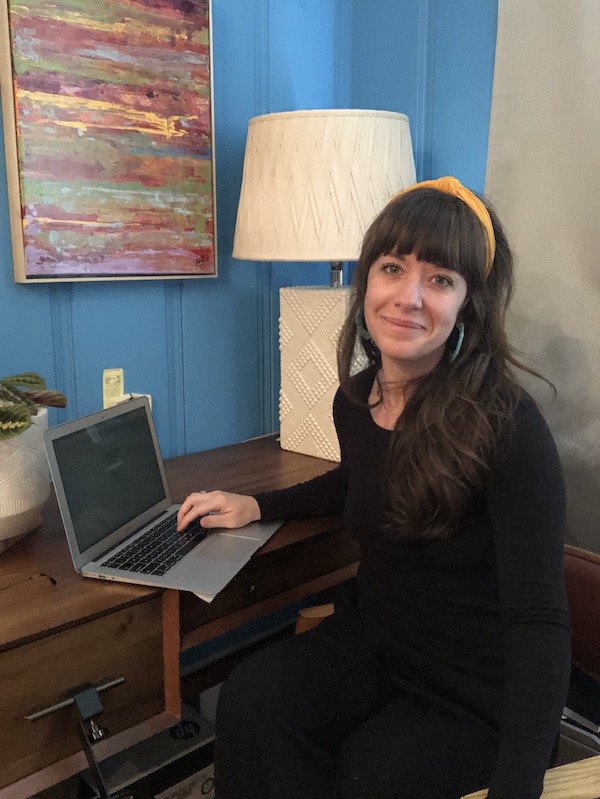At APSU, telehealth provides new creativity for counseling sessions

CLARKSVILLE, Tenn. – In the months before face-to-face interactions became taboo – something to dread the world over – Sara Beth Geoghegan often sat within six feet of her clients, listening compassionately to their fears and stresses. Then, in early March, the COVID-19 pandemic struck Tennessee, and Geoghegan, a mental health counseling intern at Austin Peay State University’s Boyd Health Services, had to find a way to help APSU students without being anywhere near them. The age of telecounseling was suddenly thrust upon her profession.
“We had to make a lot of allowances, and telehealth wasn’t really something in my tool belt,” she said. “There were no telehealth classes, so we’ve done crash course trainings.”
Now, instead of sitting across from her clients in the University’s counseling rooms, Geoghegan is using Doxy – telemedicine software – to meet with students through impersonal computer screens. The transition to this new, technology-based counseling, has been surprisingly smooth for Geoghegan’s clients.
“It’s a great tool because it’s such a generation of screens,” she said. “Computers and iPhones are definitely not new to students, so they’re pretty comfortable. And it’s allowed a new creativity in counseling which, again, they’re open to because they’ve grown up behind screens.”
New Creativity in Counseling
Geoghegan, a graduate student in Lipscomb University’s Clinical Mental Health Counseling program with a specialty in play therapy, arrived at Austin Peay last fall as an intern and immediately began counseling students struggling with mental health issues. Austin Peay’s Office of Student Counseling Services offers a range of services – including individual and group counseling and outreach programs – to help students with their emotional and mental health needs.
In a traditional, pre-pandemic counseling setting, a client and a counselor sat across from each other, which can sometimes be a little intimidating.
“It can be hard to sit and stare at someone and pour out your feelings,” Geoghegan said. “In those types of sessions, we have a different set of opportunities than we do in telemental health. Recently, I’ve started using Google image searches for some of my clients as a prompt. I asked them to use a Google search and show me a picture of what they were feeling right then.”
Some clients chose images of animals, other people, outer space and even Disney characters. Their choices often reveal deeper emotions than the clients realized. Elsa from Disney’s “Frozen 2,” singing “Show Yourself,” led to a powerful moment of exploration between a client and her mother’s broken relationship.
“We are working with a different part of the brain - the subconscious,” Geoghegan said. “There are times when even I am surprised and moved by how effective it is.”
Most of her clients – like the rest of the world – are stuck at home, so Geoghegan also uses telecounseling to explore her client’s personal environments – something she can’t do as easily in an office.
“One of my techniques is to prompt my clients to find an object around the home that represents what they are feeling right now,” she said. “One of my clients chose a large bag of toilet paper which, for her, represented feelings of fear around COVID-19, feelings of safety associated with being prepared, and feelings of anger for having to fight for a common household item.
“The challenge of working on a different platform has produced new ways of connecting on different emotional levels,” Geoghegan said. “I like to say to my clients, ‘We’re face to face, but not in the same space. This reminds them that I am still here with them, supporting them and holding space for them, even if it’s through satellites, wires and screens.’ And being in a field centered around relationships, this is of utmost importance for them to know.”
How are students doing?
Geoghegan is regularly hosting telecounseling meetings with her existing clients. These sessions began before the COVID-19 pandemic, and she’s seen a clear change in how these students are doing in this current crisis.
“There’s a definite increase of anxiety,” she said. “I hear the words ‘cooped up’ a lot. They’re struggling with the unexpected transition of doing schoolwork in a totally different setting, and not knowing how to set up a space that is conducive to getting schoolwork done.”
There’s also a shift in their support networks. Students who used to rely on friends are now back home, which isn’t always for the best.
“This is especially true with students that come from unstable homes, which produces a lot of depression,” she said. “The new environment means learning new coping skills and self-care routines. The one thing that has surprised me is their adjustment toward telehealth, which has been relatively smooth.”
Information about APSU’s Office of Student Counseling is available at https://www.apsu.edu/health-and-counseling/counseling/index.php.